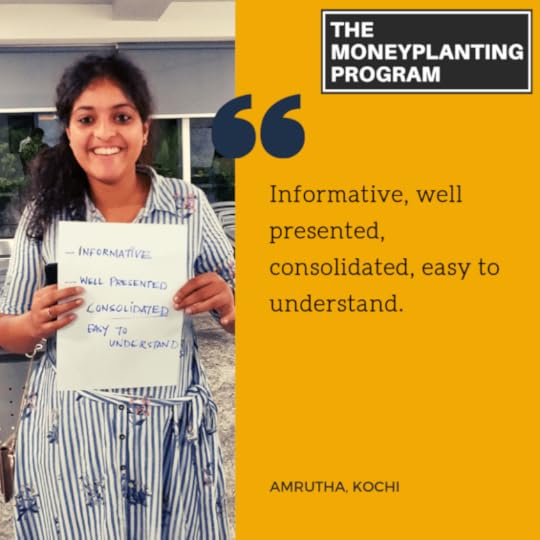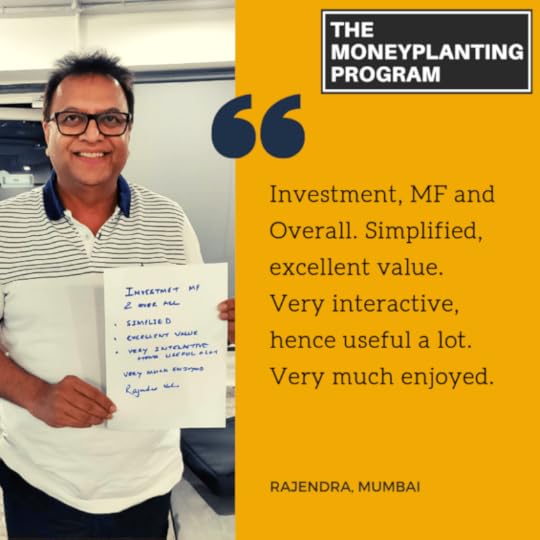Vinod Desai's Blog, page 4
July 27, 2019
Signup | Weekend Workshop in Bangalore on Money And Investing | Sep 22nd 2019 Bangalore
[Registrations closed. For next event dates, click here. ]
To RegisterSubmit the form at the end of page.Upon submission, details will be provided on how you could make the payment.Upon receipt of payment, a confirmation email will be shared.Each program accepts only 15 participants.If seats are unavailable, please subscribe to the site by clicking here. You’ll be among the first to know when registrations are opened for the next program in November 2019.Is the program right for you?Take The Moneyplanting Quiz to find out.
The questions cover critical, must-know financial trivia, and a minuscule portion of what is taught in the program. A score of less than 10 would indicate you stand to gain a lifetime of learning by attending it.
Take The QuizReviews FROM the PAST programS







 For program contents and F.A.QClick HereProgram DATE, timings & venue
For program contents and F.A.QClick HereProgram DATE, timings & venue8:30 AM to 5:30 PM | Sunday, September 22nd 2019
Venue: Near Indian Oil Petrol Pump, Old Airport Road, Domlur, Bangalore, 560048
Registration Fee [ CLOSED ]Signup Form [ CLOSED ]The post Signup | Weekend Workshop in Bangalore on Money And Investing | Sep 22nd 2019 Bangalore appeared first on The Moneyplanting Program on Financial Wellness | Vinod Desai.
May 31, 2019
Signup | Weekend Workshop on Financial Wellness | July 21st 2019, Bangalore
Registrations closed. For next event dates, click here.
To RegisterSubmit the form at the end of page.Payment info will be displayed once the form is submitted.Upon receipt of payment, a confirmation email will be shared.Each program accepts only 20 participants. You will automatically be placed in a waitlist for the next program in case seats are unavailable, and the fee will be refunded. The next program will be held in October 2019.Is the program right for you?Take The Moneyplanting Quiz to find out. The questions cover critical, must-know financial trivia, and a minuscule portion of what is taught in the program. A score of less than 10 would indicate you stand to gain a lifetime of learning by attending it.
Take The QuizFor program contents and F.A.QClick HereProgram timings & venue8:30 AM to 5:30 PM | Sunday, July 21st 2019
Venue: Old Airport Road, Domlur, Bangalore, 560048
[image error][image error][image error]Show Google Maps LocationRegistration Fee3499/- per head.
Signup Form [Closed]To know about the next program date, click here.
The post Signup | Weekend Workshop on Financial Wellness | July 21st 2019, Bangalore appeared first on The Moneyplanting Program on Financial Wellness | Vinod Desai.
February 7, 2019
Direct Mutual Fund Investment websites. Which to use?
There are plenty of Direct Mutual Fund Investment platforms out there. This post lists a few, and also the platform I personally prefer for my investments. If you don’t know about what direct funds are, and how much of an impact they make, read this article.
[image error]Priya wrote in asking:MF utilities; I feel it is not at all user-friendly. What would you say about paytmmoney and Wealthtrust websites? Are they trustworthy?
She’s right. The interface for MFU online in terrible.
But, simply from the fact that MFUtilities is run by the consortium of mutual fund AMCs in India, you could say that that is the most trustworthy platform out there. The rest are run by third parties.
I’ve personally not used paytmmoney and Wealthtrust. And even though there are plenty of other direct fund platforms, I don’t use any of them. Not because I don’t trust them, but because I’ve already found what works better for me.
I invest directly using the AMC’s website.This is what I recommend the most for a couple of reasons.
Third party Direct Mutual Fund Investment platforms are still figuring out how to stay in business.Platforms like SCRIPBOX eat your money on the side in commissions, but direct fund platforms don’t have that luxury. So the question is, how do they plan to stay afloat in the long term? Several such platforms are still figuring out their revenue streams. Some of them end up putting restrictions here and there and ask users to pay up to avoid those restrictions. I personally don’t like the ambiguity. Especially since using the AMC’s website enforces no such restrictions and will most likely always be free.
Sometimes, Direct Mutual Fund Investment platforms list funds which they don’t service.I’ve personally faced this issue with MFUtilities. The portal was showing a liquid MF which wasn’t being serviced. Even several days after transferring the amount, units weren’t allocated. I eventually had to call their service line and wait another 3 days to get a refund. It was a large sum and I ended up losing interest on it for more than a week.
You’ll need to create logins for only a handful of AMC websites anyway.I don’t find having logins on multiple websites tedious. Especially since the service is free and comes with no-strings-attached. There are no restrictions. And being run by the AMCs themselves, they’re far more reliable. You can set up SIPs, STPs, do lumpsum investments; whatever floats your boat.
if you are a beginner, you can make do with just 2 logins. Even once you’ve become a veteran, my guess is you’ll not need to create more than 5 logins.
It’s easy to track all your MF investments in one single place.Services like CAMS and Karvy can provide you with a consolidated mutual fund report, irrespective of the mode you used for the investment. So despite investing using multiple AMC websites, as long as you’ve used the same email ID everywhere, you’ll be able to track all your investments conveniently in one single place, So the chances of you forgetting your investments are rather low.
So, my recommendation to Priya would be to finalize a good fund, and directly create a login on the fund’s website. Its worked well for me, and I don’t see why it won’t work for anyone else.
Happy Moneyplanting!
Vinod
P.S: If you want to learn how find and invest in a good direct mutual fund, read Chapter 10 of the book.
The post Direct Mutual Fund Investment websites. Which to use? appeared first on The Moneyplanting Program on Financial Wellness | Vinod Desai.
November 21, 2018
Capital Gains Tax On Mutual Funds And Other Common Assets
I recently received a query about capital gains tax on mutual funds. So I decided to put together a post which covers taxation of mutual funds and other more common assets.
STCG stands for Short-Term Capital GainsLTCG stands for Long-Term Capital GainsIndexation benefit allows you to reduce your tax burden, by adjusting your gains, by claiming a loss due to inflation.‘Full value of consideration’ means the value at which the asset was sold or exchanged.Type of AssetSTCG ApplicableLTCG ApplicableStocks & Equity Mutual FundsIf held for less than 1 year. STCG Taxed at @15.45%If held for more than 1 year.Taxed at @ 10.4% without indexation for gains above 1 Lakh. First 1 Lakh is tax-freeReal EstateIf held for less than 2 years.
Taxed at @ income tax slab.
If held for more than 2 years.
Taxed at @ 20.6% with indexation.Debt Mutual FundsIf held for less than 3 years.
Taxed at @ income tax slab.If held for more than 3 years.
Taxed at @ 20.6% with Indexation.Physical GoldIf held for less than 3 years.
Taxed at @ income tax slab.If held for more than 3 years.
Taxed at @ 20.6% with Indexation. [image error]How is capital gains tax calculated?
You arrive at short-term capital gains by reducing the following items from the full value of consideration:
Expenses incurred in such a transferCost of acquisitionCost of improvementAny other exemptions if available.You arrive at long-term capital gains, by reducing these items from the full value of consideration:
Expenses incurred in such a transferIndexed cost of acquisitionIndexed cost of improvementAny other exemptions if availableWhat kind of expenses can be reduced for tax calculation?Items like brokerage, commissionIn the case of real estate, you could also reduce the costs of stamp duty, the cost of transport etc.For real estate transactions, you can also get away paying no LTCG tax at all if:
You re-invest the gains into another residential property.You buy bonds from NHAI or REC and claim exemption under Section 54EC.I’ll probably write a much exhaustive article on real estate taxation later on. But for now, this is pretty much how deep I would like to go so as not to overwhelm. This is a beginner’s blog after all.
So take stock of this, and once everything here starts to make sense, search online for advanced articles on tax-saving on capital gains. You could also get in touch with your tax accountant. And in case you are filing your taxes using online portals like Cleartax and Taxspanner, you can discuss this in detail with your assigned chartered accountant.
By the way, my first public workshop of 2019 is going to be held on Jan 5th in Bangalore. You’ll be able to find the event details here and about ‘The Moneyplanting program‘ here.
If you just want to jump to ticketing, then click here.
The post Capital Gains Tax On Mutual Funds And Other Common Assets appeared first on The Moneyplanting Program on Financial Wellness | Vinod Desai.
November 1, 2018
Mutual Fund : Should You Sell your ELSS After 3 Years?
Shriya recently read the book and had this query on ELSS Mutual funds.
I came across your book : Grownups are just kids with money and found your inputs useful. I have one ELSS with DSP Black rock. Since ELSS has locking period of 3 years .what should one do after the 3 years are completed ?
The simple answer; do nothing.There is no reason to liquidate an ELSS mutual fund, just because it’s out of the 3 year lock-in period. The point being, that selling off or liquidating any of your investments should be based on your goals.
After the 3-year lock-in, nothing about the fund changes fundamentally. The fund manager still runs the fund the same way as he/she did earlier. So if the fund has continued to perform well, you can stay invested and let the money grow. Equities work best when you stay invested for the long term. And history has proven that the longer you stay invested, the better. To see what happened to 1 Lakh of investment, when it was left untouched for 20 years, despite the stock market witnessing several minor and at least one major crash, see this post here.
So, unless you need the money to fund an immediate goal, stay invested. And if your need is say three years down the line, you are better off moving it to a debt mutual fund or an FD, depending on your appetite for risk. Remember though, that debt mutual funds and debt products like FDs are a good way to protect your money, and not necessarily to grow it. So you’ll need to strike a balance, depending on how much of it you can let grow, and how much you need to protect.This answer applies to any equity mutual fund investments; not just to ELSS funds. Always invest/liquidate based on needs and goals.
You can see the list of top mutual funds, based on their five year returns, on Value Research’s website here.
The post Mutual Fund : Should You Sell your ELSS After 3 Years? appeared first on The Moneyplanting Program on Financial Wellness | Vinod Desai.



